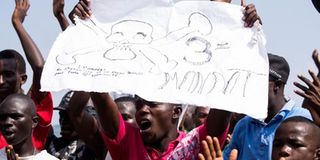New blow to Pierre Nkurunziza as Burundi election official flees

A group of protestor opposed to Burundian President Pierre Nkurunziza's third term holds a banner reading "Avenue of Democracy" during a demonstration on May 29, 2015 in Musaga area near Bujumbura. AFP PHOTO | LANDRY NSHIMIYE
What you need to know:
- A second election board member is also thought to have fled, reflecting mounting unease with the country's power structure.
- Hundreds of thousands of people were killed in the conflict, marked by massacres between the majority Hutu and minority Tutsi communities.
BUJUMBURA
Burundian President Pierre Nkurunziza's controversial bid to stand for a third term in office suffered a new blow on Saturday after it emerged a top a election official had fled the country.
Sources said the election commission's vice president, Spes Caritas Ndironkeye, jetted out of the crisis-hit central African nation late Friday, leaving behind a resignation letter and preparations for next week's parliamentary elections in disarray.
A second election board member is also thought to have fled, reflecting mounting unease with the country's power structure over Nkurunziza's attempt to stay put despite worsening civil unrest.
Human Rights Watch said Burundi has been gripped by "pervasive fear", while the International Crisis Group, a conflict-prevention think tank, said Burundi was headed back into conflict unless the president backed down.
An electoral commission source said Ndironkeye "left without saying goodbye, without saying where she was going." A second member of the five-person commission, Illuminata Ndabahagamye, is also thought to have fled, sources said.
"What has happened is a catastrophe, but it was inevitable," another commission source said.
"Technically, the Election Commission can continue to work with four out of five members. But if two have left, no decision can be taken and it will be impossible to replace them before June 5," the source said.
DEATH THREATS
Burundi's crisis surrounds Nkurunziza's bid to stands for a third consecutive five-year term in office, something that opposition and rights groups say move violates the constitution as well as the terms of a peace deal that ended a 13-year civil war in 2006.
Hundreds of thousands of people were killed in the conflict, marked by massacres between the majority Hutu and minority Tutsi communities.
Asked to rule on the issue, Burundi's constitutional court found in favour of the president, but not before one of the judges also fled the country, claiming that its members were subject to death threats.
The capital Bujumbura has been hit by weeks of civil unrest that has left at least 30 people dead in a major security crackdown, and the crisis intensified earlier this month when a top general staged a failed coup attempt — increasing fears that the impoverished, landlocked country could be plunged back into all-out war.
The opposition has also said the holding of free and fair elections is impossible, with independent media silenced and allegations of threats and intimidation by Nkurunziza's supporters.
Parliamentary elections are due to be held on June 5, with a presidential poll scheduled for June 26.
According to HRW, police have used "excessive force".
"Medical personnel, journalists and human rights defenders have received death threats and menacing phone calls, and been intimidated and harassed by the authorities," the group said. Many threatened were in hiding or had fled the country, it added.
"In this climate of fear and uncertainty, several scenarios are possible for Burundi's immediate future, ranging from the highly improbable withdrawal of President Nkurunziza's candidacy to the significantly more dangerous path toward a more or less violent, and intractable, conflict," the ICG also said in a report released on Saturday.
Regional heads of state are due to meet again Sunday in Tanzania's Dar es Salaam to discuss Burundi's crisis but it is unclear whether Nkurunziza will attend.
RELEASE DETAINEES
The last time the president left the country, for the previous regional summit on May 13, some members of the armed forces tried to overthrow him, launching an ultimately unsuccessful coup attempt.
UN special envoy Said Djinnit has said talks between the government and opposition had made progress on several issues — including the reopening of independent media and the release of detainees — but not on the key issue of a halt to protests in return for Nkurunziza's agreement not to stand again.
He said both sides "have agreed to resume their talks after the summit in Dar es Salaam."
Nkurunziza, a former rebel leader and born-again Christian, argues that his first term did not count as he was elected by parliament, not directly by the people. His bid for re-election also has strong support in rural areas and among sections of the Hutu majority.





